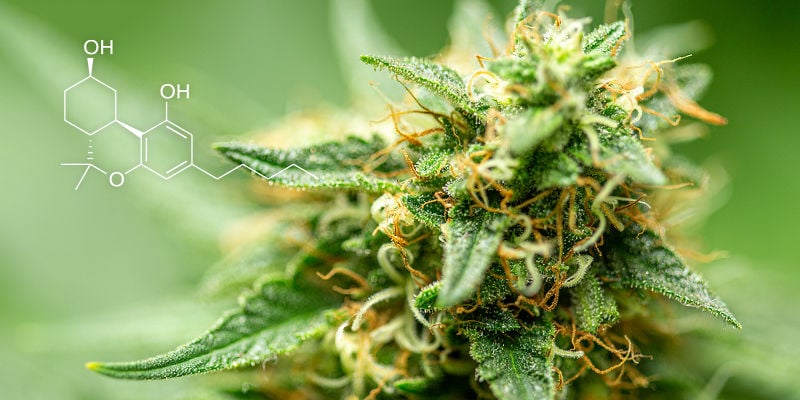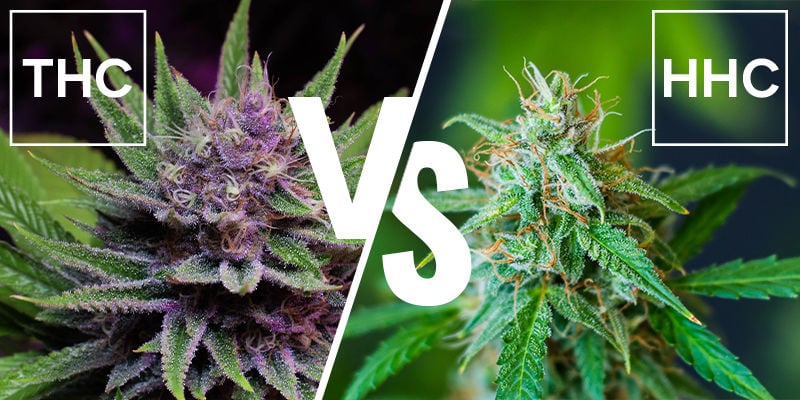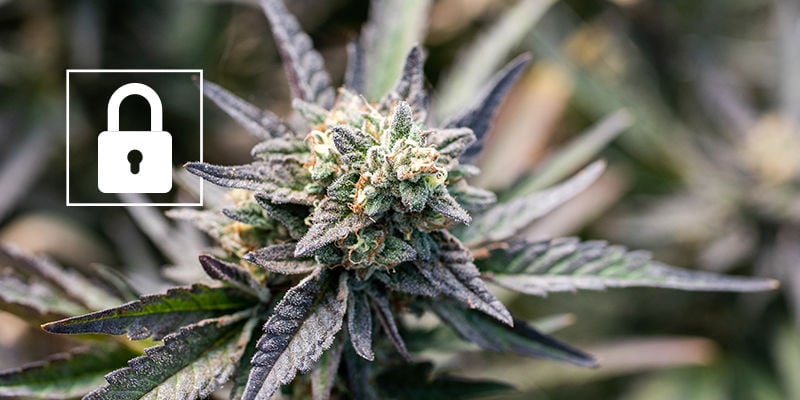
What You Need To Know About Hexahydrocannabinol (HHC)
A new cannabinoid called HHC is making significant waves across the cannabis industry, especially in North America, where HHC vape cartridges and flower are flooding dispensary shelves and marketed as a legal alternative to THC. Keep reading to learn what little we know about this novel cannabinoid, its legality, safety, effects, and more.
Have you already heard about hexahydrocannabinol or HHC? This semi-synthetic cannabinoid is making headlines across the globe, touted as a “clean”, safe, and, most notably, a legal way to experience a high similar to THC. However, what is HHC, how is it made, and how does it work in the body? In this article, we take an in-depth look at this new member of the cannabinoid family, examining its production, pharmacology and safety.
What is hexahydrocannabinol (HHC)?

HHC is a cannabinoid that's shaking the cannabis community. Like Δ-8 THC, most of the hype surrounding HHC comes from its similarity to Δ-9 THC. But unlike “traditional” THC, HHC has a more complicated legal status. While it shares a lot of similarities with its natural counterpart, hexahydrocannabinol is a different compound with a unique molecular structure and effects.
Is HHC synthetic or natural?
Many sources have dubbed hexahydrocannabinol a “semi-synthetic cannabinoid”. This is because while it has been found in trace amounts in the cannabis plant, the HHC currently sold in dispensaries is derived synthetically from THC. In fact, HHC was first discovered in a lab rather than in cannabis.
American chemist Roger Adams first synthesised HHC in the 1940s. Adams was head of the Department of Chemistry at the University of Illinois from 1926 to 1954, and served as a critical cannabis researcher at the time. Adams was even granted a licence to continue studying cannabis even after it was federally criminalised under the 1937 US Marijuana Tax Act (The Marihuana Tax Act of 1937 - Full Text of the Act, n.d.).
It's estimated that Adams, together with the 250+ graduate students he taught over his career, ran over two hundred different experiments on cannabis during his time at the University of Illinois. Through these experiments, Adams and his students isolated and/or synthesised many cannabis compounds for the first time, including THC, CBD and HHC, and documented the unique relationships between these and other components of the plants.
What is the difference between HHC and THC?

While HHC occurs naturally in the cannabis plant, its concentrations are typically very low. For the large amounts needed for consumption today, it is commonly synthesised in the lab by using THC as the starting material. In many ways, HHC and THC are similar, but there are a few key differences that set the two compounds apart.
Is there a difference between HHC and delta-8, delta-9 and delta-10?
First and foremost, HHC and THC have different chemical structures. Whereas Δ-8 THC has a double bonding at the 8th carbon atom in the central ring, Δ-9 has this bonding at the 9th carbon, and lastly, Δ-10 has the same style bond at the 10th carbon. HHC is simply missing those double bondings. These minor differences make HHC a much more stable compound than THC, giving it a much longer shelf life (THC naturally degrades to CBN when exposed to heat and light).
What does HHC do to you?

HHC has the potential to provide a wide variety of effects for users. While HHC is thought to be not as potent as its THC counterpart, that's not to say that it doesn't have its place in cannabis culture. Whether through the use of cartridges or oils, HHC has plenty to offer.
Can HHC get you high?
Yes, HHC is psychoactive. For now, most of the information on its effects comes from user reports, which are very subjective—as expected. HHC product manufacturers support this, claiming that HHC is roughly 70-80% as potent as THC.
Unfortunately, there is little information on how HHC acts in the body. However, its psychoactive effects and similar chemical structure to THC suggest it likely binds to the CB1 and CB2 cannabinoid receptors, but more research is required to confirm HHC's exact mechanism(s) of action.
Users describe the effects of HHC as similar to that of THC, only less intense. HHC has the potential to offer some cerebral and “heady” highs that are uplifting, energetic and slightly euphoric. Of course, it's important to remember that, like with other cannabinoids, the effects of HHC are subjective and depend on a wide variety of factors such as body chemistry, tolerance as well as the setting and even the quality and quantity of the product you're using. And of course, your mood!
Does HHC have any side effects?
As mentioned, the research on the effects of HHC is in its infancy, and the same can be said for the side effects also. Users may experience side effects such as dry eyes, lower blood pressure, light-headedness or dry mouth. However, many of these side effects are seen as “par for the course” when it comes to cannabis consumption, albeit when consumed in larger amounts.
Is HHC legal?

HHC, like other THC variants such as Δ-8 and Δ-10, is often touted as a legal way to get high. Yet, the legality of all of these cannabinoid analogues is very complicated and understandably varies by region.
In the US, HHC is legal under the 2018 Farm Bill, which allows hemp and hemp products to contain minimal levels of THC. Thanks to an unintended interpretation of this law, HHC can be sourced from THC in hemp and shipped/sold across all 50 states.
As often happens in the cannabis space, many of the world's governments are playing catch-up and have yet to clarify their stance on HHC. For anyone interested in buying HHC products locally or having them shipped to their country, we recommend contacting your local authorities for detailed information on whether or not HHC is legal in your area.
Will HHC show up on a drug test?
Again, the lack of research into HHC makes it difficult to know if consuming this cannabinoid will impact drug test results. In theory, drug tests screen for THC metabolites, predominantly the compounds 11-OH-THC and THC-COOH. As HHC is distinct from THC, one might assume it won't be metabolised into one of the aforementioned compounds, but we can't know for sure. Hence, we recommend not consuming HHC for a minimum of four weeks prior to a drug test to avoid a potential positive test result.
Additionally, small cannabinoid contaminations, such as the presence of Δ-8, Δ-9 or Δ-10 THC in HHC products, may also result in positive drug tests.
Is HHC safe?

There are no studies into the short or long-term effects of HHC because it has only become available for large-scale consumption very recently. Most of what we know about this compound comes from user reports and claims from HHC manufacturers.
However, a recent report showed that the toxicology relating to HHC was similar to that of THC, meaning that they were essentially deemed as “safe” by the European Monitoring Centre for Drugs and Drug Addiction (EMCDDA). However, this is an isolated study, and much more research is needed on the subject of HHC.
If you're interested in trying HHC products, remember to do your due diligence. Check to ensure that buying and/or using HHC isn't against the laws of your country or region. Also, be sure to screen the manufacturers you intend to buy from to ensure their products are of the highest quality. Some HHC companies offer third-party test results to help you gain more insight into the composition of their products.
Though so much is unknown when it comes to HHC, it still retains some similar effects as THC for users. The more we learn about this cannabinoid, may make HHC products much more accessible to people in various regions of the world. For now, all we can do is keep up with new developments as and when they appear.
- -. (April 12, 2023). EMCDDA technical expert meeting on hexahydrocannabinol (HHC) and related cannabinoids | www.emcdda.europa.eu - https://www.emcdda.europa.eu
- Bloom AS, Dewey WL, Harris LS, & Brosius KK. (1977 Feb). 9-nor-9beta-hydroxyhexahydrocannabinol, a cannabinoid with potent antinociceptive activity: comparisons with morphine - https://pubmed.ncbi.nlm.nih.gov
- q. (n.d.). The Marihuana Tax Act of 1937 - Full Text of the Act - https://www.druglibrary.org
-
 7 min
31 January 2025
How To Pass A THC Drug Test (2026)
There's no doubt that a drug test can be an intimidating prospect, but you're in the right place. We cover everything you need to know about THC drug tests, and delve into the various methods, both...
7 min
31 January 2025
How To Pass A THC Drug Test (2026)
There's no doubt that a drug test can be an intimidating prospect, but you're in the right place. We cover everything you need to know about THC drug tests, and delve into the various methods, both...
-
 6 min
9 August 2022
What Is Cannabidiol (CBD)?
CBD has risen to stardom in the supplement world. But what propelled a single plant-derived molecule to such great heights? There are certain elements at play here. Early research has turned out...
6 min
9 August 2022
What Is Cannabidiol (CBD)?
CBD has risen to stardom in the supplement world. But what propelled a single plant-derived molecule to such great heights? There are certain elements at play here. Early research has turned out...
-
 3 min
3 December 2021
What Is Delta-8 THC (∆⁸-THC)?
With so many cannabinoids in cannabis, it's only a matter of time before they're all thoroughly researched and utilised. With unique effects and potential benefits, one such cannabinoid that's...
3 min
3 December 2021
What Is Delta-8 THC (∆⁸-THC)?
With so many cannabinoids in cannabis, it's only a matter of time before they're all thoroughly researched and utilised. With unique effects and potential benefits, one such cannabinoid that's...
-
 4 min
13 June 2019
Everything You Need To Know About THC
THC—this simple molecule inspires millions of people to grow cannabis every year. But what exactly is THC? And why do people love it so much?
4 min
13 June 2019
Everything You Need To Know About THC
THC—this simple molecule inspires millions of people to grow cannabis every year. But what exactly is THC? And why do people love it so much?





 United States
United States











